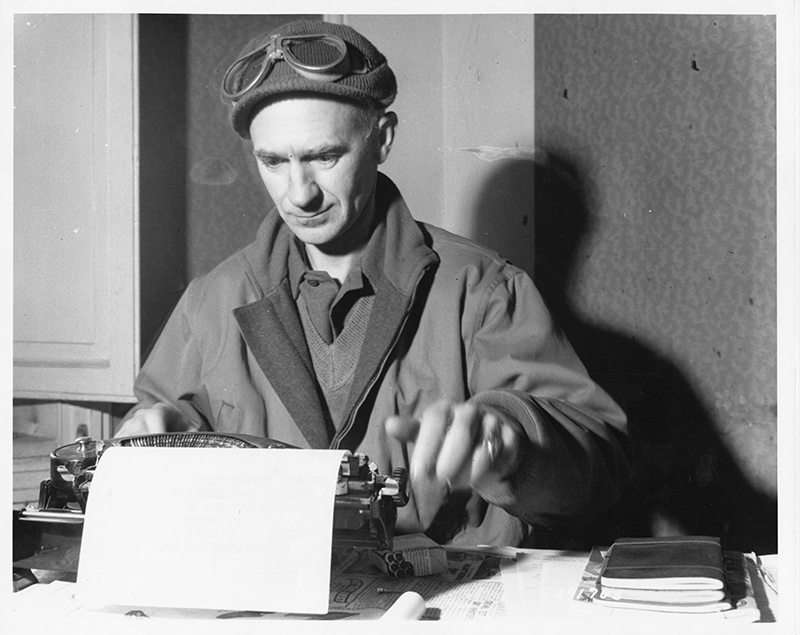Collection context
Summary
- Creator:
- Howard, Roy Wilson, 1883-1964
- Abstract:
- Roy W. Howard Papers consist of business records from Scripps-Howard, published articles, video recordings, audio recordings, personal papers, scrapbooks, and photographs.
- Extent:
- 60 Boxes
- Language:
- Materials are in English
- Preferred citation:
Howard, Roy Papers, MSA 1, The Media School Archive, Indiana University, Bloomington, IN
Background
- Biographical / Historical:
Roy W. Howard was an innovator who, while leading Scripps Howard Newspapers, protected the rights of a free and independent press. Yet he thought of himself as a reporter, often traveling the globe to land critical interviews with world leaders.
Howard wasn't born in Indiana and he isn't an IU alumnus, but he did have Hoosier ties. Born in Ohio in 1883, he spent his boyhood in Indianapolis, where his first entry into journalism was as a newspaper carrier. As a schoolboy, he delivered the The Indianapolis Star in the morning and the Indianapolis News in the afternoons.
While still in high school, he began selling his own articles to those newspapers and eventually became a full-time reporter at the Star, and later, sports editor at the News.
From there, his ambition and talent led to his post as New York correspondent for Scripps McRae Newspapers. He quickly made a name for himself and, in 1912, had worked his way up to president of United Press.
He took a hands-on approach to furthering UP's reach as an international news resource. One of his first tasks was to combat the competition, Associated Press by hiring American reporters to cover Europe "straight," as traditional journalists, instead of relying on foreign news services that too often were mouthpieces of governments.
He also traveled to South America to end a news monopoly and then to Great Britain to break a cartel that had cut off the agency's press quota on British cables from Europe.
Howard never lost his nose for news, and the excitement of the story led him all over the world. He filed a story from France announcing the armistice of World War I.
He moved to Scripps newspapers in 1920, and by 1922, he was leading the company. He bought and consolidated newspapers and instituted a practice of investigative and public service journalism that, over the next decades, led to breaking union racketeering, uncovering bank scandals, exposing political corruption and prompting governmental safety regulations in the workplace.
He never stopped reporting. In 1933, he traveled to Manchuria along the front of the Sino-Japanese War, covering it first from the Japanese side and later with the Chinese forces. He obtained an interview with Emperor Hirohito, the first ever granted to an American newspaperman.
In 1936, Howard interviewed Joseph Stalin at the Kremlin, and the next day, was outraged that his story had been "edited" by Kremlin authorities. When Stalin saw the original draft, he ordered Howard's version restored.
Scripps-Howard Newspapers remained independent of local party ties. A disgruntled reader complaining of what she perceived as columnists' political leanings received a personal letter from Howard. Published later as "An Editor's Creed," the letter reflects Howard's belief that journalism's mission is to grant "readers the fullest possible access to the truth and the greatest possible divergency of viewpoint."
Howard officially retired in 1953 but remained active in the company until his death at age 81 in 1964.
- Scope and Content:
Business records include legal documents, memoranda, notes related to Roy W. Howard's professional life, mostly his tenure at Scripps-Howard Newspapers and United Press.
Personal papers include correspondence with his family.
Publications include newspaper and magazine articles that Roy W. Howard wrote in his lifetime.
Photographs include business and personal photographs taken throughout Roy W. Howard's lifetime. Roy W. Howard's images can be accessed at Roy W. Howard Image Collection Online.
Audio and visual recordings include interviews and documentaries with or about Roy W. Howard.
- Acquisition information:
- Acquired: 1983
- Processing information:
Processed by Joshua Bennett. Completed in 2015.
- Arrangement:
The collection is organized into the following series:
- Business Papers
- Personal Papers
- Scrapbooks
- Publications
- Audio/Visual
Online content
Access
- RESTRICTIONS:
-
This collection is open for research.
- TERMS OF ACCESS:
-
Prior arrangements should be made before visiting The Media School Archive. Patrons are encouraged to communicate with the Archive in advance of their visits to ascertain availability of materials.
Photocopying permitted only with permission of the Archivist.
- PREFERRED CITATION:
-
Howard, Roy Papers, MSA 1, The Media School Archive, Indiana University, Bloomington, IN
- CAMPUS:
- Indiana University Bloomington
- LOCATION OF THIS COLLECTION:
-
Franklin Hall601 East KirkwoodBloomington, Indiana 47405, United States
- CAMPUS:
- Indiana University Bloomington
- CONTACT:
-
812-855-9247tmsarch@indiana.edu

